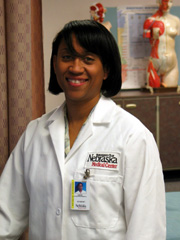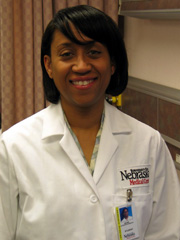 The interaction with a health professional can be a daunting experience for anyone, but perhaps nothing is more “personal” that the sharing between a patient and a mental health specialist. The idea of telling one’s “troubles” to another, especially someone who doesn’t look like the patient or share a sense of that patient’s culture is often an impossible bridge.
The interaction with a health professional can be a daunting experience for anyone, but perhaps nothing is more “personal” that the sharing between a patient and a mental health specialist. The idea of telling one’s “troubles” to another, especially someone who doesn’t look like the patient or share a sense of that patient’s culture is often an impossible bridge.
While there is a major need for diversity in all areas of health services, there is an especially severe shortage of psychiatric specialists of color. This was just one of several motivating factors that led Hope Jackson-Konnath to graduate today (May 13) as a psychiatric nurse practitioner from the UNMC College of Nursing.
“During my clinical rotations, I was constantly impressed with how many times African American patients would open up to me and tell me things that they had consistently refused to reveal to Caucasians,” Konnath said. “Mental health issues still have a significant stigma everywhere in America, but I think even more so in communities of color. I am grateful for the opportunities UNMC has opened up to me now – not just because it’s a great career, but because I want to take the message of psychiatric education to our churches and community centers. There are so many people who need and can receive excellent mental health outcomes if they could just get past the stigma of seeking professional help.”
Depression, for example, is a simple condition that afflicts thousands of people and can be managed quite readily, Konnath noted. Many of the people living in a state of clinical depression know that something isn’t quite right. Unfortunately, as Konnath has seen in too many cases, they don’t seek medical help until they reach the breaking point.
“Depression in African Americans need be no more mysterious than diabetes or hypertension,” Konnath said. “Nobody would refuse to seek help when screened for diabetes or hypertension – they know clinical help and guidance is available.
“I believe being a psychiatric nurse practitioner may help get more people of color in the door because coming to see me – a nurse – is also more subtle than saying they are going to see a psychiatrist.”
Patients who visit a psychiatric nurse practitioner will quickly realize that they are being served by a highly trained clinical mental health professional. As Advanced Practice Registered Nurses (APRN), Konnath and her peers have a master’s degree in psychiatric mental health nursing and assume the role of clinical nurse specialist or nurse practitioner.
APRNs assess, diagnose and treat individuals or families with psychiatric problems/disorders or the potential for such disorders. They provide a full range of primary mental health care services to individuals, families, groups and communities and function as psychotherapists, educators, consultants, advanced case managers and administrators.
Most significantly, APRNs have the authority to prescribe medications. In the mental health professions, only psychiatrists – who are first trained as medical doctors – and APRNs are certified to prescribe medication.
Another important value for seeking the help of an APRN is that patients can get an appointment with one much sooner than they can a psychiatrist. Few people realize it, but today 60 percent of all psychiatric-related office visits are done with APRNs rather than psychiatrists. In many locations across the nation, an appointment with an APRN can be obtained in two weeks versus up to two months for a psychiatrist.
 So just how did a former high school fine arts enthusiast wind up on the cutting edge of mental health professionalism?
So just how did a former high school fine arts enthusiast wind up on the cutting edge of mental health professionalism?
Konnath grew up in Houston, Texas, graduated from Klein High School in 1986, and moved to Omaha in 1990 when her father was relocated by his employer, Union Pacific. Konnath worked for several years and then decided to finally pursue her college degree. She graduated from the University of Nebraska at Omaha in 1999 with a bachelor’s of science degree in biology.
Konnath entered Creighton University’s Accelerated Nursing program – an honors curriculum that provides a bachelor’s of science in nursing degree in one year, instead of four.
Although she seriously considered medical school, Konnath had been married to Corie Konnath in her last year at UNO and just didn’t feel she wanted to put her family through another four years of intense academics. So, she started her nursing career in the NICU at Creighton University Medical Center (formerly St. Joseph’s Hospital).
“But, I never forgot my first psychology course in college,” Konnath said. “I was always more interested in the mental issues of people lives. There is something about helping to heal the spiritual health of a patient – relieving that inner turmoil – I just felt called to pursue.
“In addition, over time, I really came to see that we just have to get more people of color into this profession. There really is a need for cultural sensitivity in mental health education. We have research now that documents, for example, how African American children are diagnosed at a lesser rate for ADHD than other children. These kids may have classic symptoms – trouble focusing, staying on task, concentration and focus irritability – and may be getting failing grades, even may be fighting. But too many get diagnosed as oppositional defiance and conduct disorders, instead of being treated for ADHD.”
Konnath wants to be a bridge between expanded mental health education at the community level and increased cultural competency among the professional ranks. Once she passes her National Certification Examination for Psychiatric Nursing Practitioner, her ultimate goal is to enter UNMC’s College of Nursing Doctorate of Nursing Program and pursue a Ph.D. with a focus in “ethnopsychopharmacology.”
Now a member of the American Psychiatric Nurses Association, Konnath looks forward to gaining clinical experience, while pursuing increasing opportunities to make presentation in the community. She wants to help develop more scholarship opportunities for minorities at the BSN level to pursue the advanced degree. Konnath also wants to be a face of the APNA at more community health fairs and gatherings.
“I already have a great relationship with another African American APNA in Omaha – Cheryl Willis,” Konnath said. “We’re also members of the Omaha Black Nurses Association. We are determined to work with everyone we can to bring psychiatric services out of the community closet into a much better light.”